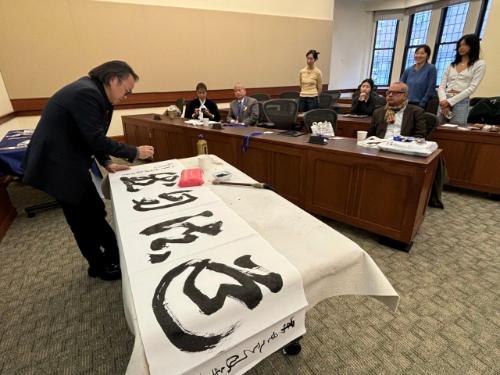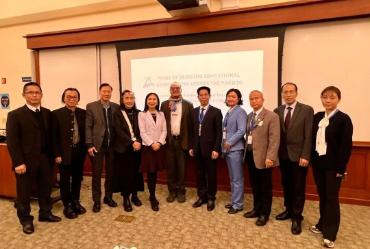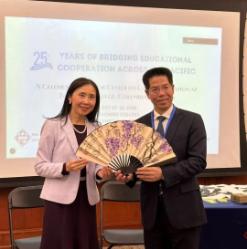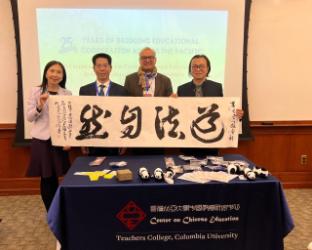Session 5 (Thursday, October 16, 2025)
Seminar: Philosophy, Chinese Traditional Medicine, and the Way of Life
The seminar featured Professor Jincheng Li, Vice President of Guangdong Pharmaceutical University, and Professor Satyajit Bose, Professor & Associate Director of MS in Sustainability Management at Columbia Climate School and SPS. The program opened with a video introduction to Guangdong Pharmaceutical University, one of South China’s earliest institutions of higher education in pharmacy, located along the Zhu Jiang (Pearl River) in Guangzhou. During the event, Mr. Hanyu Yu, renowned landscape painter and calligrapher, conducted a live calligraphy demonstration, inscribing the phrase “Dao Fa Zi Ran” (“Following the Way of Nature”) as a tribute to the symposium’s theme.

Mr. Hanyu Yu performed live calligraphy — “Dao Fa Zi Ran.”
Professor Li delivered a keynote speech titled “Philosophy, Chinese Medicine, and the Way of Life.” He explained the philosophical foundations of traditional Chinese medicine (TCM), emphasizing the dynamic equilibrium between Yin and Yang as the essence of health—an ever-evolving state of balance between opposing yet interdependent forces. He further stressed that moderation in diet, regular routines, balanced exercise, and emotional harmony constitute the core of healthy living, aligning personal well-being with natural rhythms.
Building on this philosophical lens, Professor Satyajit Bose explored how TCM principles offer meaningful insights for global environmental sustainability. Extending the human-centered and self-regulating wisdom of TCM to ecological systems, he examined parallels between bodily balance and climate dynamics such as the carbon cycle. Framing his argument through the concept of “the unity of heaven and humanity” (tian ren he yi), he emphasized that individuals, societies, and nature form a single interconnected ecosystem. Drawing on The Book of Rites (Liji), he illustrated the progression from self-cultivation to family harmony, national governance, and ultimately global equilibrium, describing it as a pathway linking personal health to planetary sustainability.


